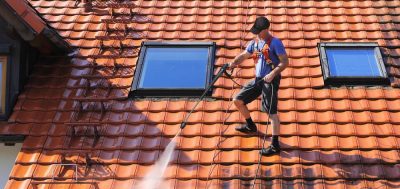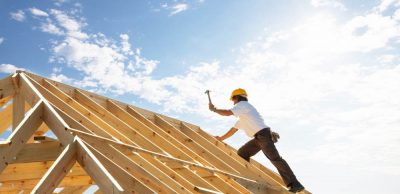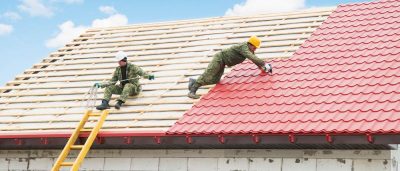- Oneflare /
- Cost Guides /
- Roof Insulation

How much does roof insulation cost?
$1,200 - $2,200
What's on this page
- How much does roof insulation cost?
- Roof insulation cost per square metre?
- Factors impacting roof insulation costs
- Different types of roof insulation
- Does the cost differ based on location?
- How to create an accurate estimate
- How to hire a roof insulation installer
- Save hiring a roof insulation installer
Read Related Roof Insulation Articles
How much does roof insulation cost?
Roof insulation choices today range from old-fashioned sheep’s wool and fibreglass to reflective foil, recycled polyester, and stone wool. Insulation prices are calculated by size, value, and thermal quality, and it can vary widely. You can expect to pay $1,200 to $1,300 for average-priced bulk fibreglass that covers 100 square metres. On the other hand, reflective insulation may cover 60 square metres for a mere $115.
How much does roof insulation cost per square metre?
A range of products leads to a wide range of pricing. If you start with a 100-square metre area without access issues, fibreglass roof insulation cost is about $1,100, which breaks down to about $11 per square metre. A polyester product may double that, increasing the price to $2,200 overall and $22 per square metre.
Factors impacting the cost of roof insulation
With a new build, it’s easier to choose your insulation because it can be added during the construction phase. Adding more to an existing home can be more difficult due to space and environmental issues, such as the cost of removing old insulation, especially asbestos.
The thickness or ‘R-value’: If you are talking to your roofer about roofing costs, keep the insulation in mind. Very light roofs require a less-expensive 4.1 R-value, while dark roofs require a more expensive 5.1 R-value.
Accessibility for installers: Installation can be difficulty in existing homes. You’ll want to ask what needs to be done to reach isolated areas. The installation will be more expensive if space is cramped, dirty, very hot, very cold or hard to stand-in.
Major obstructions in roof space: Obstacles are an accessibility issue that may have to be addressed by removing inner or outer cladding, which can, in turn, increase costs.
Even spacing across ceiling joints: Installers will have to spend more time if they have to cut installation to fit unevenly spaced areas.
Price estimates for different types of roof insulation
Labour costs range from $50 to $80 depending on the type of insulation and the ease of access. A typical bid for a house or retrofit shed insulation will incorporate that into the final estimate.
Reflective foil: Inexpensive insulation, reflective foil is used by many roofers. It forms a barrier by reflecting heat or cold away from the house. Covering 60 metres by 1350 millimetres, a roll costs about $100, making it the most affordable option to insulate a roof. It’s also a great option if you’ve been curious about how to insulate a colorbond shed.
Glass wool: Glass wool insulation is made of recycled glass bottles. It is a fibrous material that can cause cuts to the skin. Installers must use a mask, goggles and gloves to handle it safely. A 120-square metre space is about $800 when using fibreglass. Loose-fill may run about $1,200. Natural sheep wool For about 120 square metres of sheep’s wool insulation, you can expect to pay about $1,600.
Earth wool: Earth wool is similar to glass wool, but is a specific type of insulation (not a category) that is more eco-friendly and generally easier to handle. Earthwool insulation price is around $85 to $100 for a roll of 20 square metres with a low R-value.
Polyester insulation: Polyester insulation is produced from recycled plastic and certified as non-flammable. The material is considered itch-free and much less dangerous to touch than glass wool. Containing no breathable fibres, this option may be significant for asthmas sufferers and those allergic to dust. Polyester costs more than fibreglass for the same R-value.
Stone wool or Rockwool: Highly fire-resistant, this material is made from volcanic rock. Rockwool insulation price is more expensive than fibreglass.
Spray foam insulation: This type of insulation is sprayed in place rather than by hand. The average cost to insulate a roof with spray insulation is between $1500 to $3000. Spray insulation is more cost-effective in the long run as it will keep the house cooler in summer and warmer in winter, minimising the need for air conditioning and heating. Learn more in our cost guide.
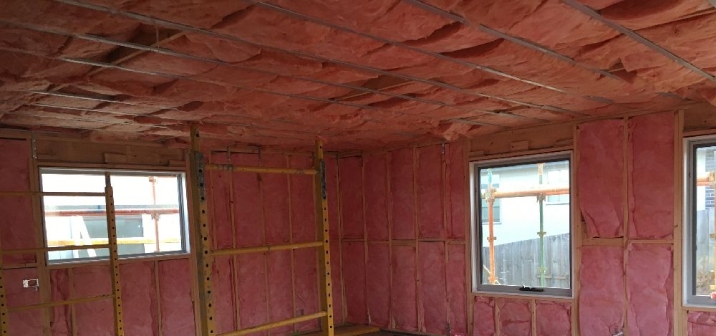
An example of glasswool insulation being used in a room under construction. | Source: Yakks Batts
Does the cost differ based on location?
The cost of labour is most likely to be different in less populated areas than in Sydney, Melbourne or other big cities. Similarly, roof insulation Sydney cost for the product may be higher.
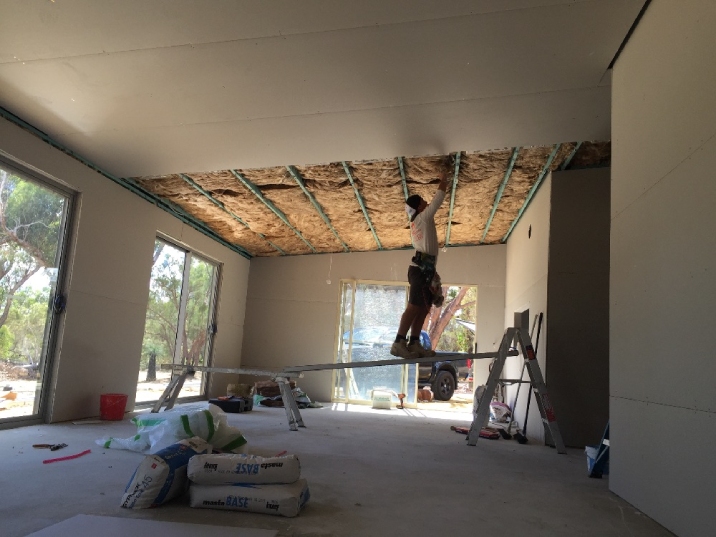
Applying the finishing touches to a roofing insulation. | Source: get gyprocked
How to create an accurate estimate
To determine a framework, it’s important to get an insulation quote from more than one contractor in your area. A roof specialist can tell you what R-value you need, which materials could work in your home, and what the labour costs would be to use those particular materials.
How to hire a roof insulation installer
Make sure to check credentials and references. The professional should have experience with the insulation material you choose and the ways to overcome obstacles to installation.
Tips on how to save money when hiring a roof insulation installer
Tip #1: As the R-value rises, the cost increases, but you must make sure to use the best R-value for your home. Poor insulation won’t perform well enough to reduce the gas or electric bill.
Tip #2: To get more for your money, consider more insulation for the entire house to give you the best results.
* The cost data is based on Oneflare and third-party sources
